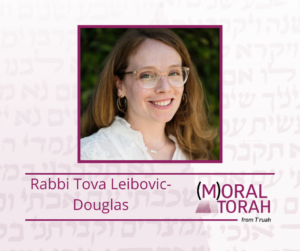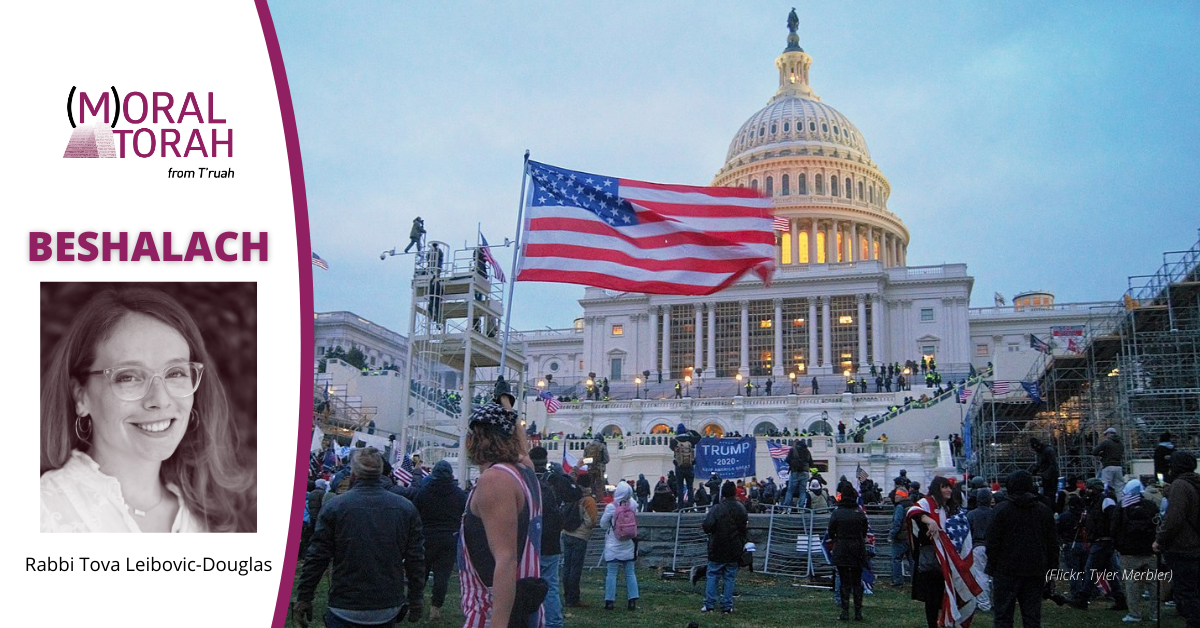A D’var Torah for Parshat Beshalach by Rabbi Tova Leibovic-Douglas
Someone asked me recently if I was a “Social Justice Rabbi.” I found the question odd, so I replied, “If you mean a rabbi that cares about everyone’s human rights and our world? Then yes, I am a Social Justice Rabbi.” And I continue to ponder this question as we navigate the chaotic world of today and consider this week’s parshah. I wonder, after witnessing the attempted insurrection at our Capitol by white supremacists, if I really care about all of the people in this world.
This week in Parshat Beshalach, we read the pinnacle moment of the greatest liberation narrative ever told. This is the moment when, after Pharaoh’s heart is hardened, the Israelites flee and then wait with anguish and fear while crying out to God. Moments later, they witness the miracle of the splitting of the sea. This transition of a people, from fear of certain death to faith and redemption, is unlike any other. It is no wonder that the prophetess Miriam immediately bursts into song!
The issue with this narrative is that it prompted my then three-year-old daughter to ask at our seder: “But why did the Egyptians have to drown?” The adults answered: “They were the bad guys and they were evil.” We then used our fingers to remove wine from our cups to remind us of the hardship the Egyptians faced. She stared at us dumbfounded. This is the question that I pose today: Why did they have to drown? What would our story look like if the Israelites had found freedom, and the Egyptians did not perish?
Sign up to receive Moral Torah in your inbox each week.
I am a deep believer in the powerful value of teshuvah (repentance), or as Rav Kook stated, “…for the person to return to themselves, to the root of their soul.” (Rav Kook, Lights of Penitence 15:10) The possibility of teshuvah is nearly always present. I take this sacred work seriously as an advocate for those who are in recovery and even those who have committed unspeakable crimes. I must admit that my thinking on the matter was not always this way. When I first started working as a spiritual counselor at Beit T’shuvah, a recovery addiction center in Los Angeles, I was terrified to work with anyone who committed a crime. At the time, I was comfortable with individuals striving for recovery, but individuals who committed murder or theft felt like they were in a different category. It was clear, however, after meeting with my first client, that my self-righteous, judgemental self needed to dissipate in order to be a spiritual counselor.
I learned that there was hardly anything that separated me sitting in my chair and them sitting in their chair — that their crime was the result of circumstance, luck, and terrible choices. These choices ultimately needed teshuvah. I recognized that I was privileged, lucky, and blessed, and filled with the same inherent self doubt, self-inflicted wounds, and yetzer ha ra (evil inclination); I just was fortunate to live a different path. I realized that it was my obligation to utilize my wounds to work with the individual in recovery, a difficult process.
We are living in perilous times. It is evident who the “bad guys” are. The white supremacists and insurrectionists that ran through our Capitol with a desire to destroy our institutions and democracy, like their leader, have hearts so hard it is impossible to see them ever softening. There is no mistaking this nor the systemic racism that plagues us; part of me can only see this truth and I am, like you, screaming for justice.
But when I read Beshalach, in this moment, I wonder if I am really doing the inner work that we must do as humans in order to see each individual as if they are created in the image of God. Even in such a moment of insurrection, it must still be possible to see them as God’s children before their hearts were hardened. I wonder if I am at a moment today, like I was in the beginning of my rabbinic career, that requires me to shift internally in order to be the social justice rabbi I want to be and build the world I want to build for my children.
Find more commentaries on Parshat Beshalach.
There is a story in our rabbinic tradition that reimagines this narrative in a way that I would like to share with my daughter and the next generation. In Pirkei d’Rebbe Eliezer 43:8, Pharaoh becomes the model of teshuvah by becoming the King of Nineveh. Once he saw the wicked actions of his people in Nineveh, he “arose from his throne, rent his garments and clothed himself in sackcloth and ashes, and had a proclamation made to all his people, that they should fast for two days.” In this story, Pharaoh lives to be a model of teshuvah.
Our task is to begin these conversations while pursuing justice to the greatest extent of the law. We must start to see the humanity in one another, especially when it feels impossible. This is the spiritual task of our lifetime and can only enhance the sacred work of social justice. I want to build a world where my children (the one who was three is now six) see that it is possible to fight for the values that matter while knowing that we are inextricably linked in a collective narrative in which teshuvah is always possible. We must see our enemies as individuals who are created in the image of God; just like them, we, too, are flawed. We are perfectly imperfect. We are human beings who have both the yetzer ha tov (good inclination) and the yetzer ha ra. In the Talmud (Yoma 69b), there is a story of the yetzer ha ra being caught and locked up. One might think that the world would have been better, but in this story, the world screeches to a halt.
We are living through a moment of a spiritual revolution. We are faced with a sacred task to see each and every individual as they are: flawed, redeemable, human, and uniquely holy souls. If we can begin to find ways to do just that, I believe we will be building a world of social justice, one that would align with the wisdom of our children.
 Tova Leibovic-Douglas (she/her) is a rabbi, spiritual counselor, educator, speaker and consultant based in Los Angeles. She has created, developed, and implemented programs for communities around Los Angeles including: Community Mikveh at American Jewish University, Beit T’shuvah, Ikar, Miller Introduction to Judaism Program, Sinai Temple, Camp Ramah and Valley Beth Shalom. She believes that each and every person is a unique holy soul with gifts to share. Tova and her husband, Austin, are the parents of Eve Meora and Nora Zahava, who are teaching them the art of living in the moment. She is a proud work in progress.
Tova Leibovic-Douglas (she/her) is a rabbi, spiritual counselor, educator, speaker and consultant based in Los Angeles. She has created, developed, and implemented programs for communities around Los Angeles including: Community Mikveh at American Jewish University, Beit T’shuvah, Ikar, Miller Introduction to Judaism Program, Sinai Temple, Camp Ramah and Valley Beth Shalom. She believes that each and every person is a unique holy soul with gifts to share. Tova and her husband, Austin, are the parents of Eve Meora and Nora Zahava, who are teaching them the art of living in the moment. She is a proud work in progress.

